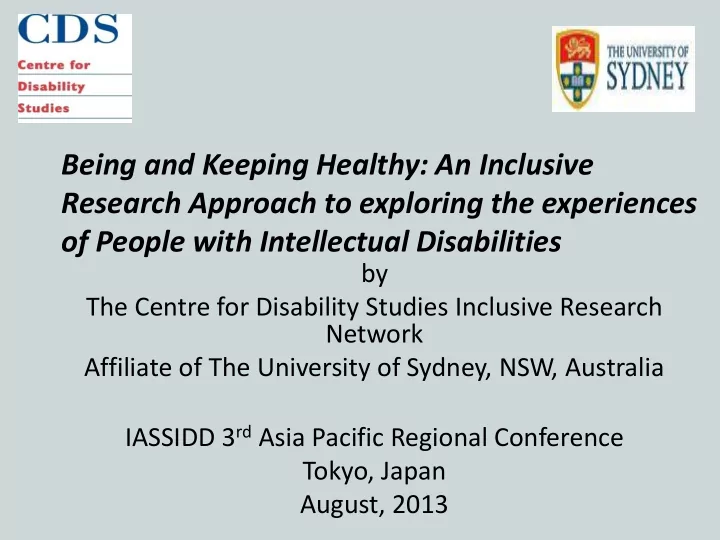

Being and Keeping Healthy: An Inclusive Research Approach to exploring the experiences of People with Intellectual Disabilities by The Centre for Disability Studies Inclusive Research Network Affiliate of The University of Sydney, NSW, Australia IASSIDD 3 rd Asia Pacific Regional Conference Tokyo, Japan August, 2013
What is the Centre for Disability Studies Inclusive Research Network? • We are a group of co-researchers with intellectual disabilities, their supporters and university researchers from CDS, Sydney, New South Wales. We do research together. • We have been working together since 2010 • Our members have changed over time but we are all still very keen to do research together “Nothing About Us Without Us” 2 “Nothing about us without us!”
Some of our Inclusive Research Network Members
Developing Research Skills • Workshops and monthly meetings over 3 years • Beginning skills in – Developing research questions – Ways of gathering information – Research ethics – Developing interview guides – Interviewing skills – Analysing the interview information (data) – Preparing presentations
What is our research about? • We wanted to do research about the rights of people with intellectual disability. • We learned about the UN Convention on the Rights of Persons with Disabilities. • We were interested to find out what are the everyday experiences of people with intellectual disabilities of the rights covered in the Convention. • We learned that not a lot of research has been done in this area. 5
Rights to Health • We have looked at peoples’ rights in the areas of health, housing, education and employment. • This presentation looks at one of these rights – that of health. • Article 25 of the Convention says that people with disabilities have the same right to good health and good health care as other people. • Our research question is “What are the experiences of people with intellectual disability around their rights to good health?”. 6
How we did the research • We decided that individual interviews were the best way to get the information we needed. • So we developed a series of questions on rights around health. • One co-researcher with intellectual disability and one without conducted the interviews with 24 people with intellectual disability. • The study was approved by the University of Sydney’s Human Research Ethics Committee. 6
What we found out 8
The Five Themes from the Data 1. It’s important to have an ally – somebody on my side 2. You need to have knowledge – finding out about health issues 3. Access – it’s more than just getting into the building 4. Quality of the doctor – what makes a good doctor 5. Concerns in the health care system – worrying things we see happening
It’s important to have an ally – somebody on my side Mum reminds me about my Mum would ring appointments a different doctor ..me, I tend to “If I get sick, if I needed a forget my key second workers ring opinion an ambulance or take me to hospital.
The Knowledge: Finding out About Health Issues The internet, I don’t know computers, Dr very much Google Seeing specialists: about health to find out social workers, ..but hopefully information or mental health will know more ask my doctor or workers, in the future chemist. dermatologist, since I have got psychiatrist my computer . There ought to be a sort of chain of command for doctors, complaint-wise! (One) that people can understand.”
Access to Health – it’s more than just getting in the building It’s hard getting “ Yeah. It’s difficult to get public transport out my up all those stairs.” way...hard to get to my doctor. My doctor used to make housecalls “Signage can be a but that doesn’t bit confusing at first happen these but you get used to days. it....”
Quality of the doctor: What makes a good doctor? I ’ve seen (my Some doctors doctor) for a Doctors communicating come across long while better with each really rude. now…she’s a Other ...I don’t care if good doctor! they’re specialists or not; they should be able to communicate. A good doctor needs to have training and They should listen experience . more.
Concerns in the Health Care system: Worrying things we see happening Doctors should treat people Medication …To shut with disabilities equally as them up, do you everyone else know what I mean? We can teach Some people have them what it’s adverse reactions to like in hospital medications, even though the side effects are supposed to stop that from happening.....
Some Reflections on Our Work • The lived experience of rights • The broadening of the research family • Recognising and valuing the diversity of expertise among the group • Working within the traditional research system • Additional time and resources needed in inclusive research efforts • But an exciting journey lies ahead!
Thank you for your attention 16
Members of Our Group Susan Adrian Lisa Hamilton Patricia O’Brien Glen Pudney Jodie Airey Suzie Jessep Mark Walters Sarah Butler Marie Knox Patrick Taylor Alex Butters Lesley Lewis Elizabeth Young Julie Deane Annie Mills Robert Griffiths Bruce O’Brien
For more information please contact Inclusive Research Network Centre for Disability Studies Phone: +61 2 9036 3600 Or patricia.obrien@sydney.edu.au
Recommend
More recommend